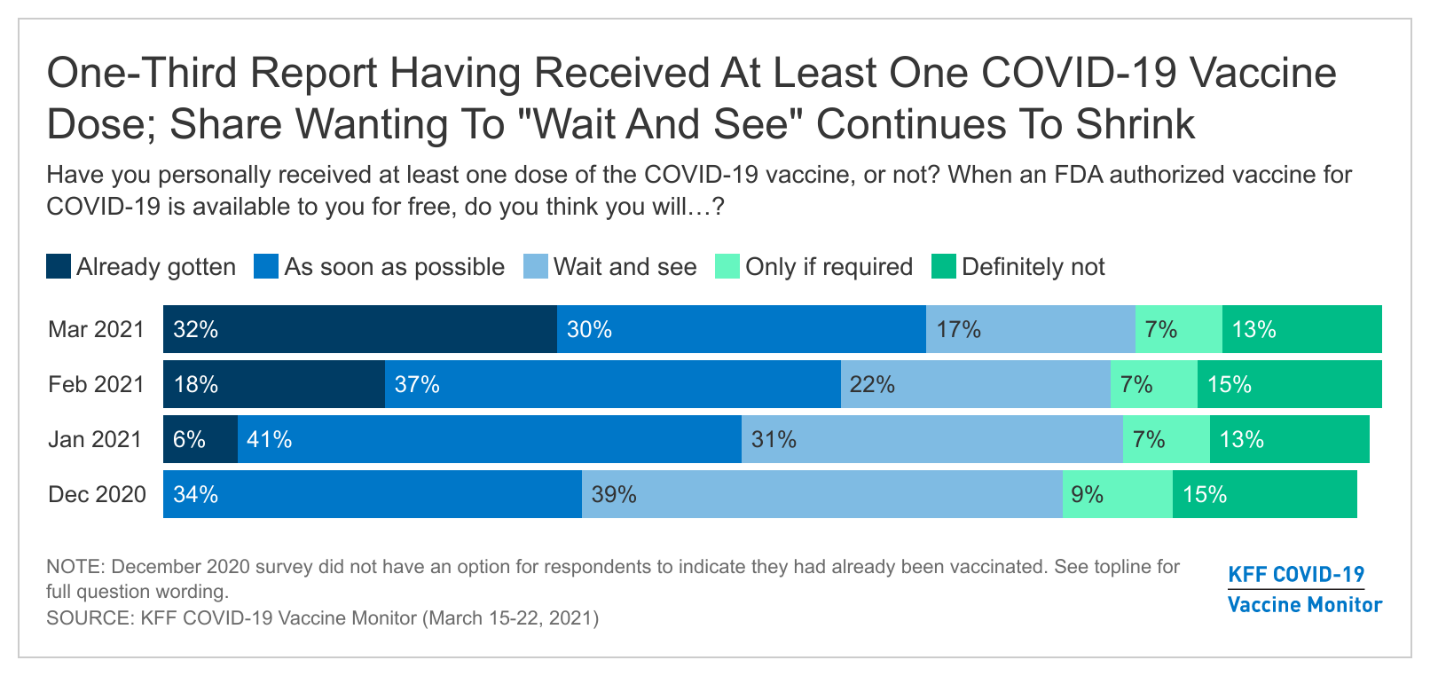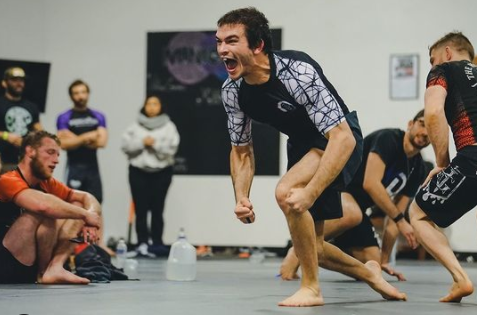Covid Vaccine Hesitancy Drops Among All Americans, New Survey Shows

A new poll of attitudes toward covid vaccinations shows Americans are growing more enthusiastic about being vaccinated, with the most positive change in the past month occurring among Black Americans.
About 55% of Black adults said they had been vaccinated or plan to be soon, up 14 percentage points from February, according to a poll released Tuesday by KFF. The rate now approaches that of Hispanics, at 61%, and whites at 64%. (Asian Americans were not polled in sufficient numbers to compare their responses with other racial and ethnic groups.)
But the poll found that 13% of respondents overall said they will “definitely not” be vaccinated, signaling that significant hurdles remain in the nation’s vaccination campaign. (KHN is the editorially independent newsroom of KFF, an endowed nonprofit organization providing national information on health issues.)
Among all groups, Republicans and white evangelical Christians were the most likely to say they will not get vaccinated, with almost 30% of each group saying they will “definitely not” get a shot.
And while the poll indicated that some arguments are effective at persuading hesitant people — such as sharing that the vaccines are nearly 100% effective at preventing hospitalization and death — those messages do almost nothing to change the minds of people who have decided not to be vaccinated.
Last week, President Joe Biden announced that the United States has administered more than 100 million vaccine doses and doubled his goal, to 200 million doses, by early May. According to KFF’s poll, 32% said they had already received at least one dose, and 30% said they planned to get it as soon as possible.
The poll also showed fewer people waiting to see how others respond to the vaccines before deciding to get vaccinated themselves, with 17% saying they fall into that “wait and see” group this month — a drop from 22% in February and 31% in January.
Young adults, ages 18-29, and Black adults were most likely to be in this “wait and see” group, at 25% and 24%, respectively.
Twenty-seven percent of Republicans and 35% of white evangelical Christians said they had already received at least one dose, the poll showed. Forty-two percent of Democrats said they have been vaccinated.
But Republicans and white evangelical Christians, along with 21% of essential workers in non-health fields and 20% of rural residents, were the most likely to say they will “definitely not” get vaccinated. One in 5 Republicans said they would be more likely to get vaccinated if former President Donald Trump strongly urged them to do so.
People who said they would “definitely not” receive a vaccine were asked to identify the main reason for their decision. The most common reason, at 17%, was that the vaccines are too new and not enough information is known about their long-term effects.
But informing people in the “definitely not” camp that scientists have been working on the technology used in the vaccines for about 20 years, among other arguments, did little to change their minds. Only about 6% said hearing that argument made them more likely to get the vaccine.
The poll found that some arguments were persuasive to those who had yet to make up their minds, though. Forty-one percent said they were more likely to get the vaccine after hearing that the vaccines are nearly 100% effective at preventing hospitalization and death from covid — the most effective message KFF tested.
Some indicated they would be more likely to get vaccinated if it were easier to do while going about their daily lives — or made going about their daily lives easier.
Of those in the “wait and see” group, half said they would be more likely to get vaccinated if it were offered to them during a routine medical appointment. And 37% said they would be more likely if their employer arranged for on-site vaccinations at their workplace. Thirty-eight percent said they would be more likely if their employer offered to pay them an extra $200 to be vaccinated.
Of those who were not already vaccinated or planning to be soon, the poll showed travel restrictions could prove persuasive. About 3 in 10 said they would be more likely to get vaccinated if airlines required passengers to be vaccinated, or if the Centers for Disease Control and Prevention said vaccinated people could travel freely and, in most cases, would not need to wear masks.
Still, 7% of those who said they would “definitely not” be vaccinated said they would be more likely to do so if airlines and the CDC were to make those policy changes.
The poll also showed that, for the first time, most of those who had not been vaccinated said they have enough information to know where and when to get a vaccine. However, problems remain: About 3 in 10 said they did not know whether they were eligible in their state. Most likely to respond that way were Hispanic adults and those under age 30, making less than $40,000 annually or who do not have a college degree.
The survey was conducted March 15-22 among 1,862 adults and has a margin of error of +/-3 percentage points.






